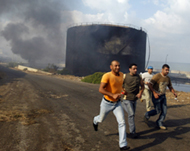Fuel supplies to arrive in Lebanon
Lebanon officials are trying to get the country back on its feet after the month-long war, with fuel supplies due to arrive in the country and businessmen vowing to rebuild damaged infrastructure.

Two oil tankers were expected at Lebanese ports on Wednesday carrying fuel oil for power stations and diesel for petrol stations. Nearly 90,000 tonnes of fuel will be delivered by the two vessels.
The tankers, chartered by the Lebanese government, were stuck off Cyprus after the ships’ captains had demanded further safety guarantees from Israel before they passed through its military blockade of the Lebanese coast.
Bahij Abu Hamze, head of Lebanon’s Association of Fuel Importers, said: “Two ships have got permission and guarantees to dock today and one should be coming in tomorrow.”
Abu Hamze said the third ship should arrive on Thursday carrying 28,000 tonnes of petrol.
“If these ships get in today, then there should be no problem with others coming in,” he said. “Now it’s up to the government to push for an end to the air and sea blockade which is natural after a ceasefire.”
Petrol supplies
Many petrol stations in Lebanon closed during the 34-day war. Stations that stayed open either limited supplies to no more than five or 10 litres for each motorist or raised prices.
Demand for petrol has soared since the ceasefire as thousands of displaced civilians attempt to drive back to their homes.
 |
|
Fuel storage tanks at the Jiyyeh |
During the war, Israeli jets struck the fuel storage tanks at the Jiyyeh power station south of Beirut. Electricity had been rationed since the conflict started with some areas of Beirut receiving less than 12 hours a day.
Philippe Douste-Blazy, the French foreign minister, during a visit to Beirut urged Israel to lift the blockade of Lebanon.
Oil prices on international markets have also fallen since the ceasefire began on Monday.
Light sweet crude for delivery in September fell seven cents to $72.98 a barrel in mid-afternoon Asian electronic trading on the New York Mercantile Exchange.
October Brent crude on London’s ICE Futures exchange lost 18 cents to $73.59 a barrel. September deliveries were down four cents at $73.76 a barrel.
Rebuilding bridges
Also on Wednesday, Lebanese business figures and private companies pledged to rebuild 12 of the 80 bridges destroyed in Israeli airstrikes.
Bahia Hariri, a Lebanese politician and sister of the Rafiq al-Hariri, the former prime minister assassinated last year, said her family has committed to rebuilding five bridges in south Lebanon, including those linking the banks of the Awali river, north of Sidon, and Zahrani, south of the city.
The Hariri group’s Geneco company will begin work very soon, she said.
Najib Mikati, another former prime minister, has commissioned the public works company Dar al-Handassah to rebuild the Madfun bridge, linking the capital with north Lebanon.
Mohammed Safadi, the transport minister, has said that $2 billion worth of infrastructure has been damaged by Israeli bombardments.